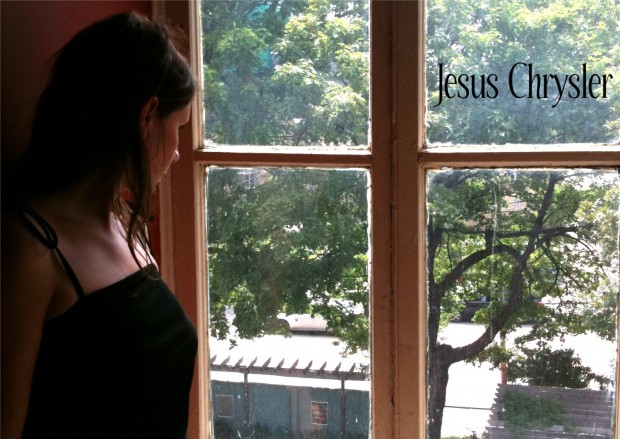
by Michael Wheeler
In the winter of 2009 I attended a theatre history lecture at Toronto Free Gallery by Alex Fallis on The Progressive Arts Club and the theatre created by artists who were opposed to many of the anti-civil rights policies enacted by Prime Minister Bennett in the 1930s. These people proved to be so fascinating that I elected to create with Praxis Theatre a show about them, Tim Buck 2, which played at The Tranzac Club as part of the 2009 Toronto Fringe Festival.
This led to our Harbourfront Centre HATCH workshop Section 98, which expanded the scope of our work to some other instances when civil rights proved to be a contentious issue for Canadians: namely the FLQ crisis, the Air India bombing, Omar Khadr, and the treatment of Afghan detainees captured by Canadian soldiers. Both the Fringe show and our HATCH workshop were extremely useful in terms of exploring who these people were, what they were concerned about, and the complexity of balancing our country’s commitment to civil rights and concerns of national security.
Unfortunately, neither of these initial explorations did an awesome job of storytelling. So this spring and summer we went back to the drawing board with this project and thought about how to move beyond ‘staged dramaturgy’ and into narrative-based work informed by these themes.
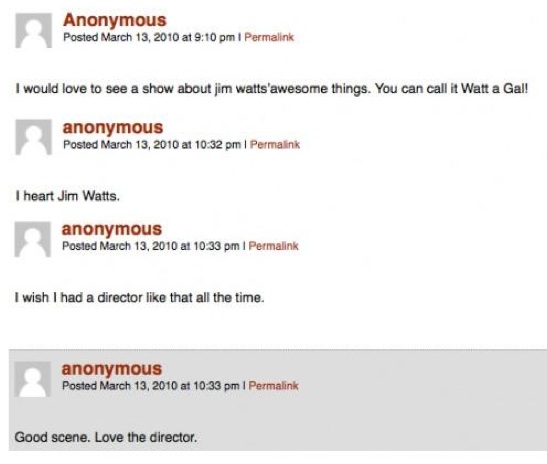
The most consistent positive feedback from our open source creative process revolved around curiosity and fascination with Eugenia “Jim” Watts.
Both presentations involved an online component that allowed the audience to participate with or respond to our work: Tim Buck 2 asked the audience to return to the website to learn the results of a poll conducted at the conclusion of a debate at the end of the show. These posts also generated some interesting conversations in their comments sections.
Section 98 was more intrinsically attached to the internet with Praxis Artistic Producer Aislinn Rose acting as Open Source Project Leader, sharing parts of our process online, actively seeking participation from our community, and developing an infrastructure that encouraged live feedback over the web or through texts during the workshop presentation.
There were also quite a few normal conversations, in person, with live human beings who had seen the show(s).
The first conclusion was that the core personality we had explored that generated a unique resonance with both audiences and ourselves was Eugenia “Jim” Watts, played in both productions by Margaret Evans. A core political organizer and theatre director in 1930s Toronto, she co-directed the legendary civil rights play banned by Bennett, Eight Men Speak, and later went on to be one of two women serving with the Mackenzie Papineau Brigade in the Spanish Civil War where she was an ambulance driver. She was also involved with a number of other projects; she was very busy, and interesting, and worth being the impetus for a work of art.
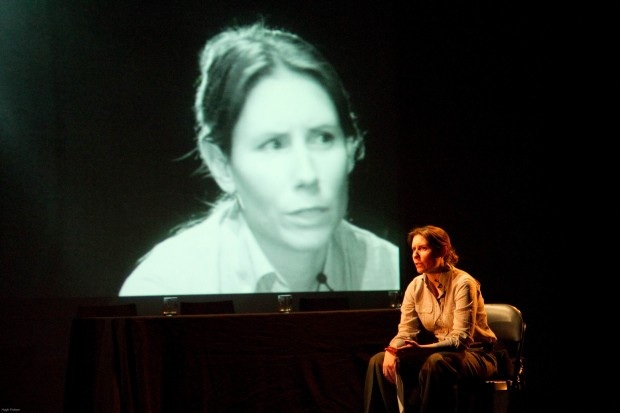
Margaret Evans playing Jim Watts in Section 98 as part of HATCH at Harbourfront Centre
The second conclusion was that this piece required a playwright, and a good one. This playwright would preferably be an artist who had experience creating theatre about historical events for a contemporary audience (we talked a lot about avoiding a ‘bio pic’) and a passion for social justice.
So it is with much pleasure and excitement we announce Dora-winning playwright Tara Beagan has joined Praxis Theatre in continuing our work on this latest iteration, . Tara and I worked together for two years on Crate Productions’ The Fort at York, and she also acted as an outside eye for Praxis on our Toronto Fringe 07 co-pro, Dyad, but Jesus Chrysler is her first official work with Praxis Theatre and we are thrilled to welcome her.
Jesus Chrysler will be presented at The Factory Theatre as part of Lab Cab on Saturday September 18 and Sunday September 19 at 5pm. The entire festival is free with all manner of art and experiences presented by over 50 artists throughout every nook and cranny of The Factory from noon to 6pm each day. We invite you to come check out the whole festival and save your 5pm – 5:20pm slot for us. This being a Praxis show, we’ll definitely welcome your feedback online or in person, with a particular emphasis on your thoughts about our transition to a script based work about a single individual.
Hope to see you there!
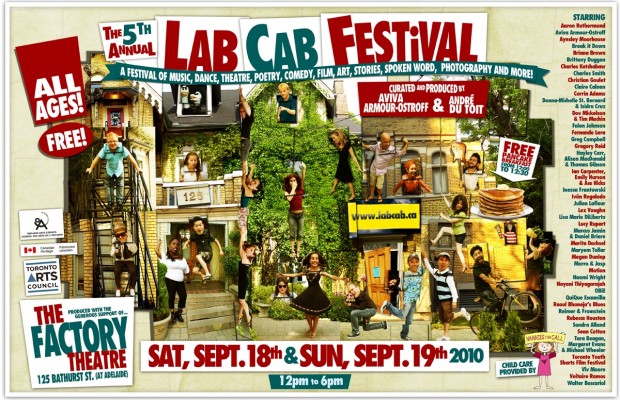
Where’s Praxis? Can you find Tara, Margaret and Michael in the Lab Cab poster? Click to enlarge
Last week Calgary’s annual theatre awards, The Bettys, took place. It was a good night for Alberta Theatre Projects (ATP), which garnered eight awards, but especially for ATP Artistic Associate Vicki Stroich, who accepted an Outstanding Achievement Award for her work as a dramaturg and advocate for new work.
Word of the awesomeness of her acceptance speech has spread far and wide, so we were pleased to see it posted on the ATP blog, which we have reprinted below with her permission.
Click here for a list of all the Betty nominees and winners
______________________________________________________________________
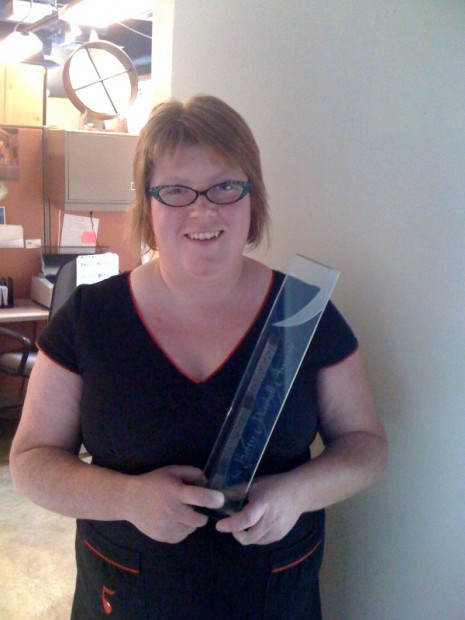
Vicki Stroich holds her Outstanding Achievement Award after giving an outstanding speech
I have a lot of people to thank because any contribution I have made has come with the support, guidance, encouragement and inspiration of the people around me.
First, thank you to the Betty Mitchell Awards Steering Committee and especially Adrienne Smook for this surprising and humbling honour.
I have to thank my teachers, my friends and my family. My parents (who are here tonight) for showing me the value of hard work and for supporting my choice to live a life less ordinary.
I need to thank all the collaborators and co conspirators I’ve worked with, all the playwrights, directors, actors, designers, stage managers and crew for the amazing and unique experience of creating new things together year after year, with all the challenges and triumphs that process brings.
I want to thank my fellow dramaturges, the ones in this room and the ones across Canada, across the border and in other parts of the world for reminding me what a vital role we have.
I thank the Canadian theatre community and most especially I have to thank this community of artists here. I grew up here in Calgary both as a person and an artist and every year I am reminded that this is a community of artists who make things happen. There is ambition and heart and an ingenuity here that is constantly inspiring. No matter how big and bold the idea, I know we will find a way to make it happen. And that’s rare. And I treasure it.
And I must thank Alberta Theatre Projects and the people who have raised me up in the theatre, who supported me, gave me not only the encouragement but the resources to foster the work and make things happen and who have done so with a great deal of love and a massive amount of good humour; Bob White, Dianne Goodman, Vanessa Porteous, Lyndee Hansen and all the great people I have worked with.
I can appreciate what goes into supporting someone or something. It’s what I have chosen to do. And as someone who has chosen to support and advocate for the vision and work of other people, it seems strange to be up here at the mic alone accepting an award for something that is meant to be behind the scenes.
But when people ask me what it is I do, exactly, I use that word “support” a lot. I also use words like listen and witness. On the surface these words might seem passive, but I have learned not to think of them that way. It has been my experience from working with artists that the act of listening, the act of witnessing is a powerful and rare contribution to someone’s work. I used to take it for granted. I don’t anymore.
The other part of that “support” is more vocal; I ask questions and advocate. I use my voice to help people understand their work better (at least that’s the goal) and if I can, I help them gather the resources and team together to make their project everything it deserves to be. I used to take that for granted, too; my voice. I don’t as much anymore.
I chose to support people because I wanted to make some contribution to the world they wanted to create, to the voice they wanted to express, to a vision they wanted to share. The unique quality of theatre to create an exchange of ideas and emotions and most of all, energy, captivates me. I didn’t think about what the result of 9 years of listening and witnessing and questioning and advocating day to day would contribute. I choose to do it everyday because, like you, I love the theatre. Because I wanted to contribute to it. Because it means something.
That I am standing here being given an award for the sum of those contributions (so far) is truly humbling. I will not take it for granted. It inspires me to contribute my eyes and my ears and my voice and my heart tomorrow and the next day and the next day and on and on.
Listening and witnessing and questioning and advocating is something we can all do. These are contributions that we can all make to our community, to our culture and to this art form that we all love. Please don’t take your own individual contributions day to day for granted. They mean something.
Click here to read the a longer post by Vicki on the ATP website for more context and inspiration!
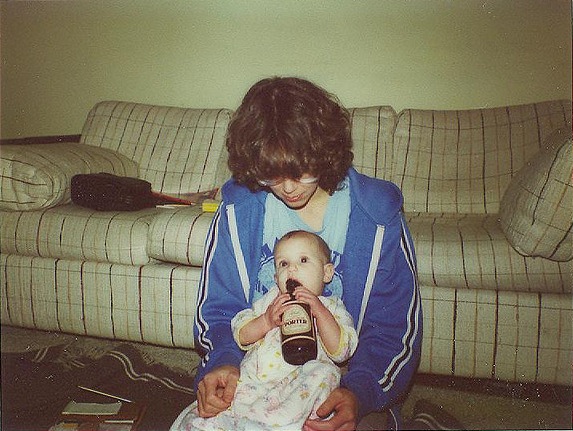
Alison learned about life in the theatre from her Mom
By Alison Broverman
Last month my mother, Sue Foster, made her Toronto Fringe debut in Act Two Studio’s Leacock Live in the Tarragon Theatre Mainspace. She’s 59. I’m allowed to tell you that, because you probably won’t believe me anyway (especially if you happened to see her at the beer tent that one night when she was buying us all drinks).
A few weeks ago I trapped her in the car on our way back from a cottage and made her tell me all about her first Fringe experience. I have adapted that car ride into a short play for your reading pleasure. Please contact me regarding performance rights. Thank you.
Act 1: Inside a Toyota Highlander driving down the 400 on a hot August day. The air conditioner is on. Alison and Sue are eating Twizzlers. Sue is driving. Alison subtly – she hopes – pulls her digital audio recorder out of her purse. She feels awkward about what she is about to ask, but it is for the greater good of the Praxis theatre blog.
Alison: So remember that night at the beer tent when you bought us all beer?
Sue: Yes…
Alison: People want to hear about your first Fringe experience.
Sue: Who?
Alison: Readers of the Praxis theatre blog.
Sue: Ok…
Alison: So can I interview you?
Sue: Really? I guess so…
Alison: So can we do it now that I’ve trapped you in the car?
Sue: Ok, sure.
Alison: Ok, so…how was your first Fringe? As a performer? [My mother was instrumental my 2007 Fringe production of Expiry Dating, building and transporting the set, hosting the opening night party, and tap dancing at the fundraiser.]
Sue: It was fun! It made me feel like I was part of a special kind of club, even though I was a performer in a show with 15 other people. Which is kind of a big cast for a Fringe show.
Alison: Not the biggest cast. I bet it wasn’t even the biggest cast this year.
Sue: I bet it was the cast with the most number of years, if you added up all our ages.
Alison: I bet that is definitely true. [The entire cast of Act 2 Studio’s Leacock Live was over fifty, several were over 70, and at least two were over 80.] So what was your favourite thing about being in the Fringe festival this year?
Sue: Hm. My favourite thing about the Fringe festival. This is gonna sound strange, but…handing out the little flyers. [She laughs.]
Alison: Why?
Sue: Because I got to say “come and see this show, I’m in it!” But without having the pressure of being the star or anything. And I thought our little bookmark/flyers were kind of cute.
Alison: They were. [They really were.] Were you nervous at all before the festival, or worried about anything?
Sue: I was worried that it was going to be lame. That we were going to be lame. But I think we…weren’t. I hope we weren’t.
Alison: I don’t think you were lame. [I’m a good daughter, obviously, but they really are not lame. Adorable, yes. Not lame.]
Sue: I was a little bit worried that we would be lame, but then once we got a bit of feedback from people who attended rehearsals, and from some of the members of Act 2 who were going out to help us publicize, I figured we wouldn’t be lame.
Alison: You sold pretty well.
Sue: Yeah, we did. [Modestly] Best of the venue. So that’s pretty good.
Alison: And what was the worst part? Was there anything that sucked?
Sue: Ummm…hm. Not really. Because the thing I don’t like sometimes about a big group of people is that somebody gets nitpicky and grumpy about things. But I was able to avoid them.
Alison: Who were the nitpicky grumps?
Sue: Oh, just various people from time to time. Because they’re old, some of them, and some of them get tired easily.
Alison: Did you read any of the reviews?
Sue: I did…but I tried hard not to take them personally.
Alison: But some of them were very good.
Sue: Some of them were very good, yes. J. Kelly Nestruck was very sweet. One of our cast members responded to his first article about the Fringe, where he called us as “old actors”, and he called her back within an hour of her e-mailing him and apologized and said he was in a hurry when he wrote it, and then he gave us a really nice review once we were up and running. So that was pretty nice. The guy from…I can’t remember if it was Eye or Now, he was not very complimentary about some things, but whatever…I think I’d better take this exit and get some gas. The light just came on.
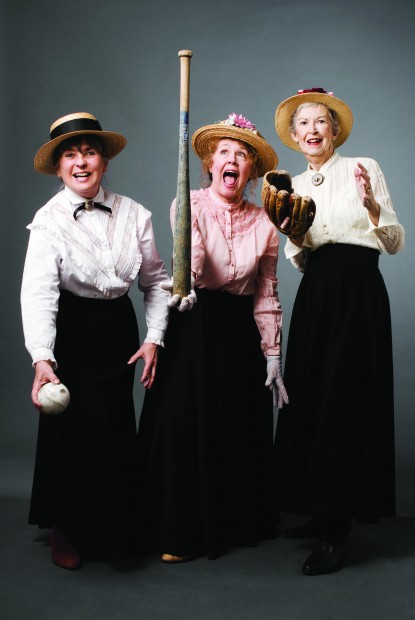
A publicity shot for Leacock Live
Alison: Ok.
Sue: I didn’t just miss an exit, did I?
Alison: I don’t think so…no, look, there’s a rest stop up there.
Sue: Oh yeah, perfect.
Alison: How did you come to be in Leacock Live in the first place?
Sue: Well, the director asked me to be in it. I think she did that because I’d done the part before…[they arrive at the gas station and fill up the car and eat more Twizzlers.]
Act 2: Back on the road
Alison: You were in the middle of saying something about…something.
Sue: Yeah, something about how the director picked me…
Alison: Oh yeah. And do you know why Act 2 chose Leacock Live for their Fringe show?
Sue: Yeah. One of the Act 2 members entered the Fringe lottery on our behalf, and she really wanted us to do Leacock Live. So we figured, since it was her entry that got us in, we did what she wanted us to do. She wasn’t able to be in it because of her work schedule, but she loved it, so that’s nice.
Alison: And what were some of the follow ups to the Fringe afterwards?
Sue: One of the people in the cast decided to contact Orillia and invited their council to come. And they invited us to kick off their Leacock Festival at the Stephen Leacock Museum. So we did the show there on late July, and they loved it, and said “Bring this back every year!”
Alison: And what else?
Sue: What else? [Sue looks at Alison quizzically.] Got any hints?
Alison: Weren’t you invited to a high school in Aurora?
Sue: Oh yeah! We were invited to a high school in Aurora. It’s a dramatic arts high school and we’re going to show them some Readers’ Theatre, I guess…And expose them, maybe, to Leacock. I was astounded to discover that Leacock is no longer taught in public schools. And it’s very sad, because he’s a historic figure in Canada. So there were many people under 30 who came to our show who actually had never heard of Stephen Leacock. You’ve read Leacock, right?
Alison: Of course! I read Leacock in grade 7. [At the nerd high school you sent me to, Mom.] So did you spend a lot of time at the Fringe tent during the festival?
Sue: I spent a few hours there…I at least passed through at least six days, and a couple of those days I stayed for a couple of hours. So yes, I guess I spent a good amount of time at the Fringe tent.
Alison: And did you see anything else good?
Sue: Yeah, I think I saw about 12 shows. [They babble for awhile about how Craplicker was such a great show with such an unfortunate title.]
Alison: Any other thoughts you’d like to add about making your Fringe debut at the age of 59? It is ok if I put your age in there, right?
Sue: Sure, I don’t care if you tell people I’m 59. They won’t believe you anyway. I just think it might be fun to do another Fringe show sometime, something different. It made me think anything’s possible.
Alison: Do you feel differently about the Fringe now, having been in a show yourself?
Sue: Not really…I think I’m going to take Black Creek. We should go to the Danier outlet.
Alison: Ok!
[Alison and Sue drive to the Danier outlet, where Sue buys Alison a blue leather jacket as a belated birthday present. You see what happens when you try to interview your mom?]
* Act 2 Studios offers theatre training for people over the age of 50.
* To see Alison’s new jacket, try to run into her sometime in the fall. It’s too hot to wear it yet.
Alison Broverman is a Toronto-based arts reporter and playwright whose mother taught her to drink at an early age


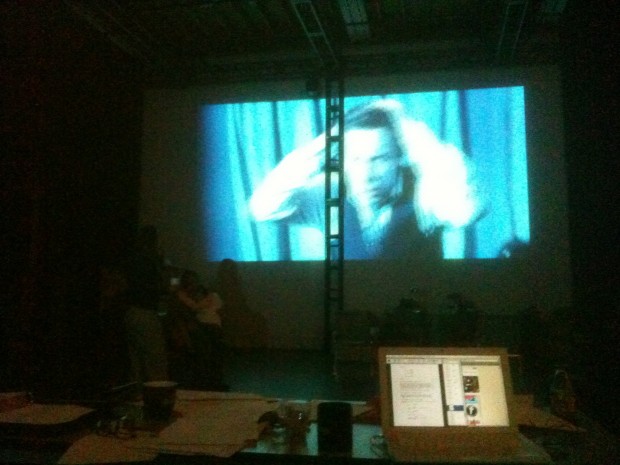
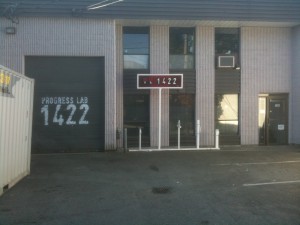
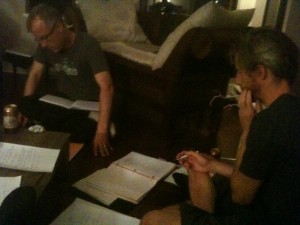







Recent Comments